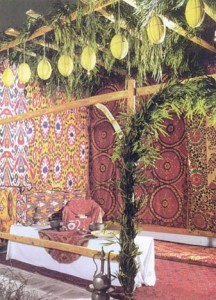Page 9 - Sukkot
This feast is known as the feast of booths or also as the feast of Tabernacles, because our ancestors dwelt in booths on their way to the Promised Land.
This feast is also known as the feast of harvest חַג הָאָסִף Khag ha-Asif, because at this time the harvest of fruits in orchards and vineyards ended.
The Torah commands us to celebrate Sukkot on the fifteenth day of the seventh month for seven days.
The first and eighth day is the (Holy) Assembly, it means that all work is prohibited apart from the preparing of festive meals.
The Torah commands us to rejoice and live in a Sukka for seven days.
The 16th, 17th, 18th, 19th, 20th and 21st days have the status khol ha-moed - semi-holiday, it means necessary works are permitted.

In the Russian empire Karaites used to build only one Sukka in kenasa, that was decorated with willow branches and grapevines and with the best fruits. At Sukkot after morning and evening worship, Karaites go in the Sukka and they sing songs composed specially for this feast, which remind us of the lives of our ancestors in the booths. Egyptian, Turkish and Iraqi karaites ie karaites living in Islamic countries, used to build Sukkot at each Karaite house.
The eighth day is called the day of the assembly שְׁמִינִי עֲצֶרֶת Shemini Atzeret, because on this day the people of Israel went to Jerusalem to hear the reading of the Torah, the Torah was read and interpreted to people by priests.